Denture is a removable prosthesis to replace missing teeth and gum. It is also known as false teeth or flippers. Generally, dentures are classified according to the pattern of missing teeth and base material used. Dentures have been part of our human civilization. They exist much longer than you would imagine. No doubt until today, it is still a relevant and cost effective option to replace missing teeth despite the rise of dental implant in recent decades.
Full dentures / Complete dentures
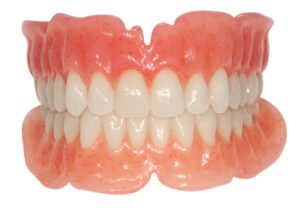
Complete dentures are used in fully edentulous patient (no natural teeth left) to replace all missing teeth and gum. They sit on top of the gum and get the retention from the suction created by intimate fitting of denture border to oral structure. For upper arch, retention is usually not a major issue. However, it is particularly challenging for lower arch due to reduced surface area, mobility of oral mucosa and tongue activity. Our clinic adopts Dr. Jiro Abe’s Suction Effective Mandibular Complete Denture (SEMCD) technique to enhance retention of lower denture and patient acceptance.
Removable partial dentures
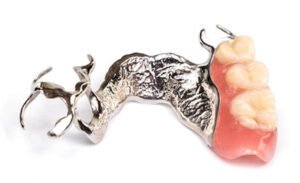
Partial dentures are used in partially edentulous patient (still has some natural teeth). Usually, partial dentures rely on the remaining natural teeth by using metal clasp to hold the denture in the mouth (retention). The advantages of partial denture include ease of fabrication, no surgery required (especially for those with medical condition that contraindicate implant surgery) and ability to restore missing teeth and gum at the same time. They can be further divided based on denture base material used in the construction.
Overdenture
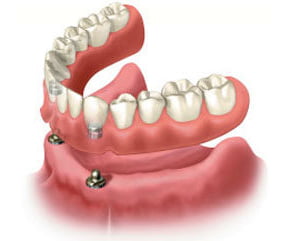
Overdenture is a removable prosthesis that covers natural teeth, roots or dental implant. In the wake of dental implant, overdenture is often used together with implant to improve its retention and stability. Thus, it is also known as implant supported denture. By using attachments like ball and joint and locator, it can vastly improve the patient experience with denture and improve quality of life.
Immediate dentures
In case where extraction is inevitable and patient cannot leave dental clinic without teeth, immediate denture can be used to restore teeth on the same day, right after the tooth is removed. This requires careful planning by the dentist and close collaboration with the dental laboratory.
Classification according to denture base material
Cobalt chromium dentures

Metal is much stronger than plastic. Cobalt chromium are often regarded as “true” permanent dentures. They are reliable, lightweight and usually fit better, meaning that they are more comfortable. Thanks to its strength, we can make it a lot thinner and smaller. For instance, we can leave the palate uncovered to reduce speech disturbance and improve taste (the temperature of the food/drink). Besides, it is also more stable when patient bites with the denture. Less deformation occurs due to the rigidity of the metal framework. Clasps are precise, custom made and cast together with the framework as opposed to wrought wire clasps that are embedded into the acrylic denture. Cobalt chromium dentures usually can last for many years.
Acrylic Dentures
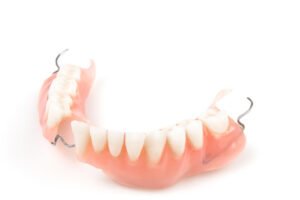
Acrylic dentures are made of food grade high impact plastic which is usually heat-cure polymethyl methacrylate (PMMA). They are relatively cheap and easy to modify, reline or repair. For example, new pink acrylic can be added to compensate gum resorption. Likewise, new acrylic tooth can be added to replace newly extracted tooth. However, due to the material strength, it has a minimum thickness requirement and often feel bulky for patient.
Flexible dentures
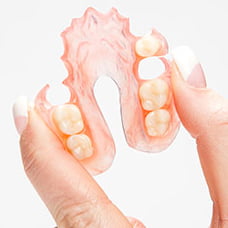
Flexible denture is popular removable prothesis made from a flexible material (nylon). It is very comfortable and highly aesthetic. Due to its excellent flexibility, it can adapt into the soft and hard tissue undercut without impinging the gum. Clasps are usually made of thin, pink flexible nylon that blend into the gum, making them almost invisible. Despite the many advantages, flexible dentures have some drawbacks. They are prone to discoloration and foul smell especially if cleaned without following the instruction. Not everyone is suitable for flexible dentures such as Valplast and Thermosens. They are mucosal borne and often led to “gum stripping” if used in unsuitable candidates.

Conclusion
One man’s food is another man’s poison. At The Smile Dental Lounge, our dentist will careful examine your mouth and recommend the best option based on individual budget and oral condition.
